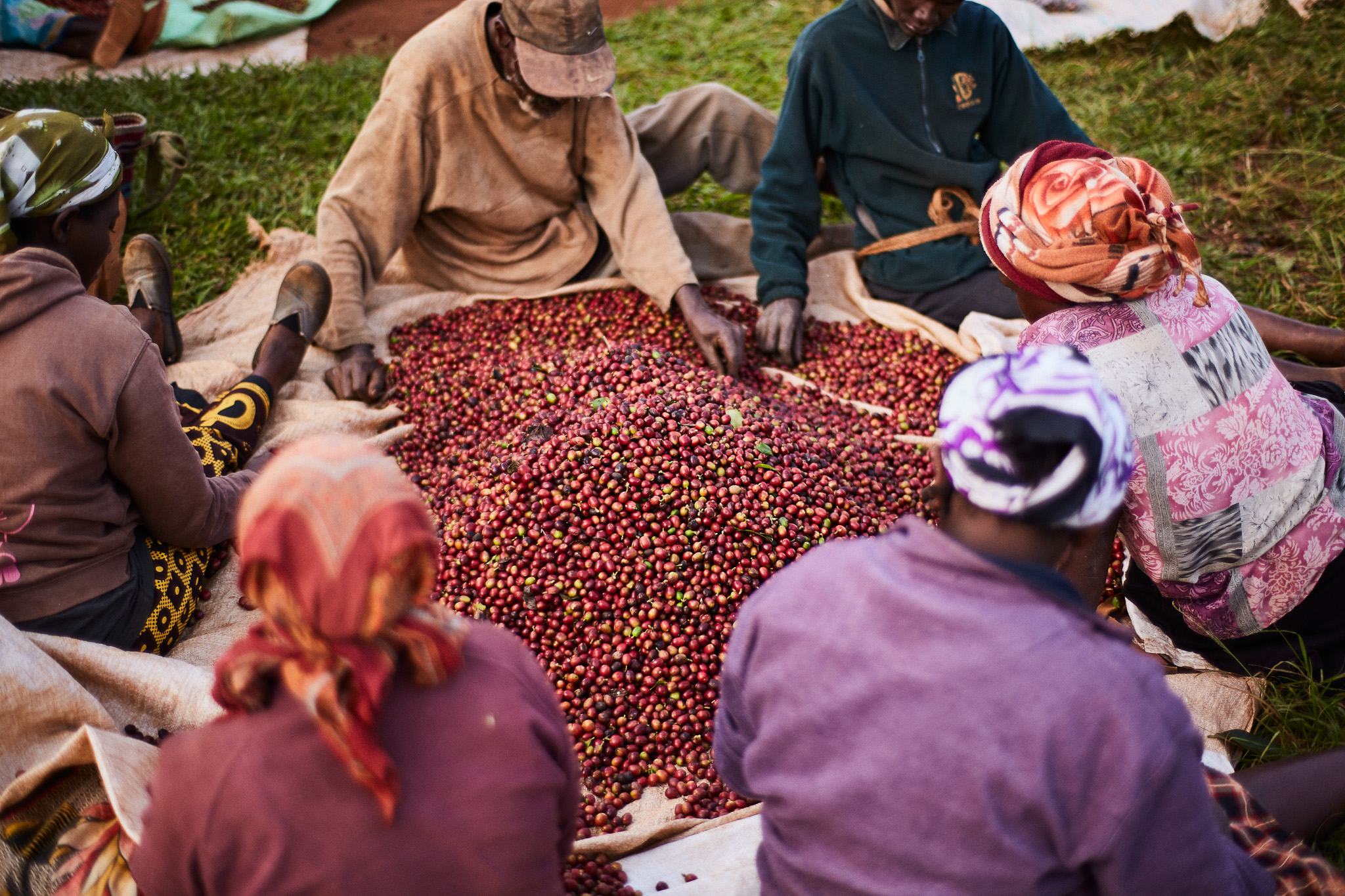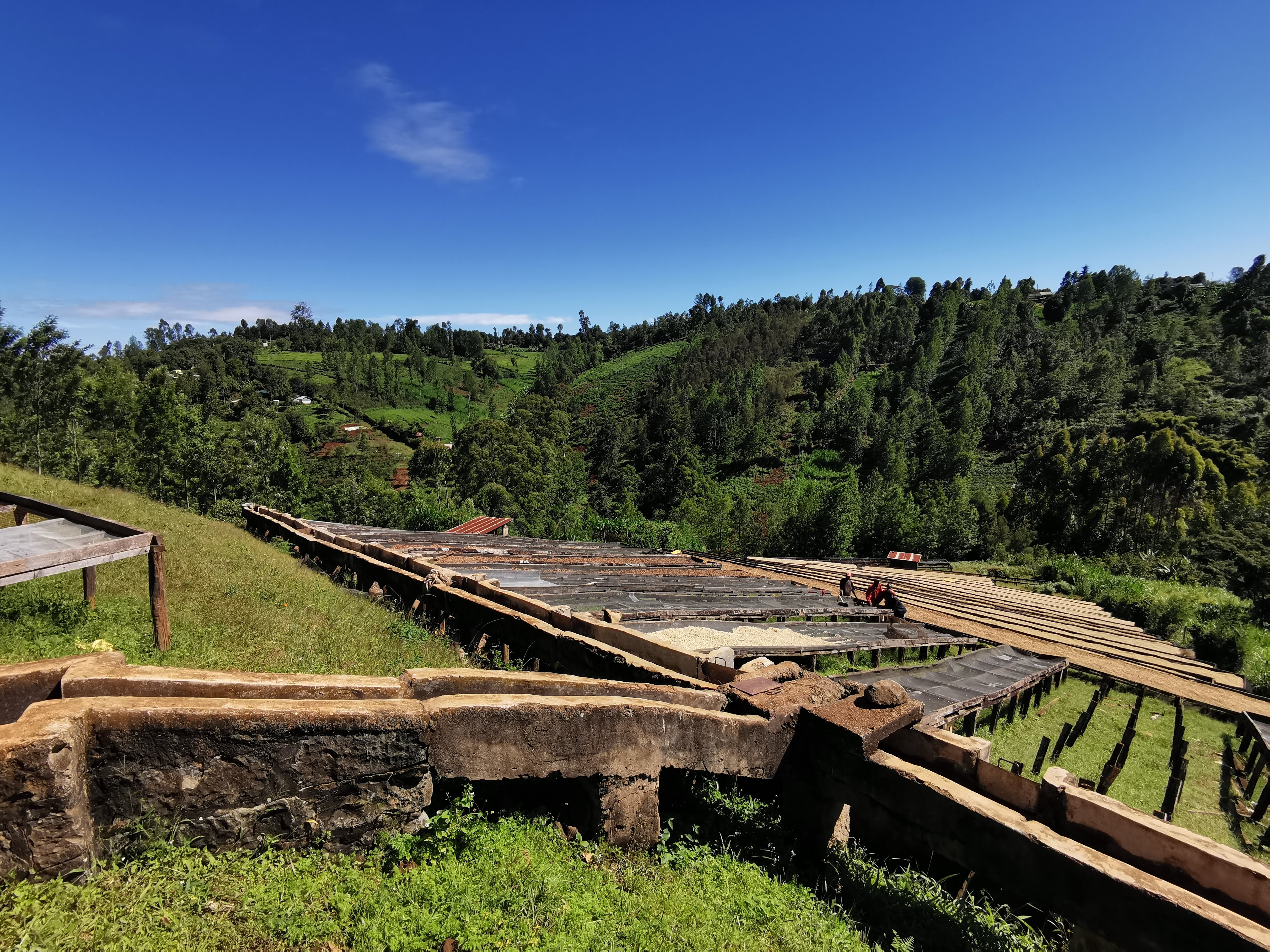Kenyan coffee is known worldwide for its clarity, vibrancy, and complexity. These coffees are structured, bright, and full of character, often showing layers of jammy blackcurrant, red berries, citrus, and floral notes. Washed lots are known for their clean and balanced flavours, while natural processed coffees from Kenya can bring more winey, wild, and process-driven flavours.
.jpg)
Coffee Production in Kenya
Our Kenya coffee production takes place mainly through a network of smallholder producers, cooperative societies, small estates, and a smaller number of large estates. Over half of all Kenya coffee beans are produced by smallholders who are members of these cooperatives.
Producers deliver ripe cherries to Kenya coffee factories (washing stations) or collection centres run by the cooperatives. There, cherries are hand-sorted to remove unripe or defective fruit. Each delivery is recorded under the farmer’s member ID, ensuring traceability and transparency.
Producers can choose to receive an initial payment for the volume delivered or accumulate their balance until the end of the season. Once all the coffee is sold, cooperatives distribute the remaining profits, after deducting operating costs, based on the total kilos each member delivered. By law, a cooperative cannot spend more than 20% of its earnings on operations; most of the partners we work with keep that figure between 9-12%, a sign of strong and efficient management.
How is Coffee Processed at Washing Stations?
At the washing stations, cherries are pulped using disc pulpers and sorted by density before being fermented in concrete tanks. After dry fermentation, the coffee is washed and soaked in clean water, steps that help achieve Kenya’s hallmark clarity and structure. Drying takes place on traditional raised beds or tables, with shading and covers used to protect the parchment from rain or harsh sunlight. Moisture content is carefully monitored throughout drying, targeting 11–12%. Some factories condition parchment at around 16% moisture before final drying to ensure even, stable results.
Where is Our Coffee Grown in Kenya?
We source primarily from smallholders in Central Kenya, including Kirinyaga, Embu, Muranga, and Kiambu. These regions are known for high altitudes, rich volcanic soils, and reliable rainfall, all ideal conditions for producing the distinctive types of coffee in Kenya that we look for.
Kirinyaga sits on the slopes of Mount Kenya, offering high elevations and fertile volcanic soils that produce bright, clean coffees with lively acidity, juicy berry notes, and a pronounced sweetness.
Embu benefits from a slightly lower altitude and varied microclimates, yielding coffees with a smooth body, balanced acidity, and flavors ranging from citrus and stone fruit to subtle floral tones.
Muranga combines consistent rainfall with rich soils, producing coffees with bright, sparkling acidity, medium body, and vibrant fruit-forward notes that are both expressive and approachable.
Kiambu, closer to Nairobi, is characterized by gently rolling hills and fertile soils. Its coffees are often well-rounded, with sweet, wine-like fruit flavors, gentle acidity, and a clean, refined finish.
Together, these Central Kenyan regions provide a consistent supply of high-quality, complex coffees that reflect the country’s renowned terroir and the care of its smallholder farmers.
Our partnerships focus on Farmer Cooperative Societies (FCS) that operate well-managed factories. By cupping extensively at the mill, we identify and select the best-performing lots each season. This focus on quality and collaboration ensures we can deliver coffees with the profiles our customers love year after year.

What Does our Kenyan Coffee Taste Like?
If you’ve ever tasted a top Kenya coffee, you’ll understand why it’s so distinctive. Expect vibrant acidity, juicy structure, and bold fruit character,think blackcurrant, red berries, stone fruit, citrus, and florals. These flavour notes are not marketing talk; they’re the result of careful processing, ideal growing conditions, and generations of expertise.
Washed Kenyan coffees tend to be clean and structured, while naturals show a wilder side, more intense, fruit-forward, and complex. Either way, the country’s coffees consistently stand out on the cupping table for their clarity and depth.
About the Producers
The majority of our sourcing partners are Kenya coffee farmers working through cooperative systems that prioritize transparency and fair payment. Well-run factories can return up to 90% of the sales price to the producers. This transparent auction system allows farmers to see exactly how much of the sales value makes its way back to them after processing and marketing costs.
By partnering with reliable Kenya coffee exporters, we ensure that these producers are rewarded for quality while maintaining traceability and consistency across every lot.
What is Special About Kenyan Coffee?
Kenya’s coffee system is built on structure and competition. The transparent auction system motivates factories and farmers to deliver their best, while our sourcing approach focuses on rewarding high-scoring, specialty-oriented coffees.
Working closely with cooperatives and exporters that share our commitment to quality and sustainability allows us to strengthen supply chains, promote fair pricing, and support long-term relationships. For us, Kenya coffee isn’t just about taste, it’s about impact, traceability, and respect for the people who produce it.
Impact on Kenyan Coffee Producers
Kenya’s coffee industry operates under one of the most regulated and transparent systems in the world. The auction system plays a central role in maintaining accountability, traceability, and fair pricing across the supply chain.
Only licensed buyers can participate in the auction, and all sales data, lot numbers, grades (AA, AB, PB, etc.), sale prices, buyer or broker details, and the originating mill or cooperative, are publicly available. This ensures that the coffee purchased at auction is traceable and that growers are paid through a clear, accountable process.
After each sale, cooperatives receive a detailed settlement statement outlining the gross sale price from the auction, processing and transport costs, marketing and brokerage fees, taxes, and the net amount payable to the cooperative. This breakdown allows farmers, through their cooperative’s records, to see exactly what proportion of the auction price they receive after deductions.
In addition, cooperatives are legally required by the Coffee Directorate (under the Agriculture and Food Authority, AFA) to maintain transparent records of all payments and deductions, share member payment statements, and undergo annual audits and general meetings. These measures ensure that farmers are informed, payments are traceable, and funds are distributed fairly and efficiently.
Well-managed factories can pay back up to 90% of the sales price to their members. Competition for cherries between factories and private buyers further drives quality, as higher prices are paid for better coffee. Our sourcing focuses on these high-performing, specialty-oriented cooperatives that prioritise quality and integrity.
By partnering with these groups and initiatives, we help strengthen sustainable practices, ensure fair and timely payments, and build long-term relationships that reward farmers for producing exceptional coffees. The result is a supply chain that’s transparent from farmer to buyer, and coffees that truly reflect Kenya’s remarkable potential, with profiles rich in blackcurrant, red berries, stone fruit, and floral notes.
Learn more about our other coffees from East Africa
Tanzania Specialty Coffee Comeback & What has changed at Origin
Buying Specialty Coffee in Rwanda: Challenges, Updates and Impact
Our project in Bulambuli: strengthening Uganda's potential
Check out our Offer List to see our coffees available from Kenya.

